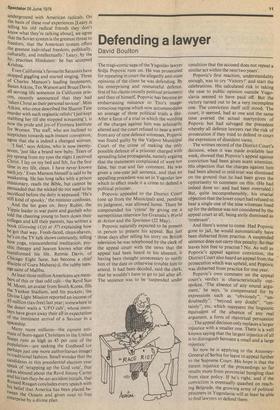Defending a lawyer
David Boulton
The tragi-comic saga of the Yugoslav lawyer Srdja Popovic runs on. He was prosecuted for repeating in court the allegedly anti-state opinions of the client he was defending. By his enterprising and resourceful defence, first of his clients (mostly political prisoners) and then of himself, Popovic has become an embarrassing nuisance to Tito's imageconscious regime which now accommodates an average of three political trials a day. After a farce of a trial in which the wording of the charges against him was arbitrarily altered and the court refused to hear a word from any of nine defence witnesses, Popovic was found guilty by the Valjevo Municipal Court of the crime of making the only possible defence of a prisoner charged with spreading false propaganda, namely arguing that the statements complained of were not false, but true and fair comment. He was given a one-year jail sentence, and thus an appalling precedent was set in Yugoslav law which in effect made it a crime to defend a political prisoner.
Popovic appealed to the District Court (one up from the Municipal) and, pending its judgment, was allowed home. There he compounded his 'crime' by giving me a surreptitious interview for Granada's World in Action and the Spectator (22 May).
Popovic naturally expected to be present in person to present his appeal. But just three days after telling his story on British television he was telephoned by the clerk of the appeal court with the news that the appeal had been heard in his absence, it having been thought unnecessary to notify him of the date or otherwise trouble him to attend. It had been decided, said the clerk, that he wouldn't have to go to jail after all. The sentence was to be 'suspended under condition that the accused does not repeat a similar act within the next two years'.
Popovies first reaction, understandably enough, was to cry 'Victory!' and start the celebrations. His calculated risk in taking the case to public opinion outside Yugoslavia seemed to have paid off. But the victory turned out to be a very incomplete one. The conviction itself still stood. The court, it seemed, had at one and the same time averted the actual martyrdom of Popovic but had salvaged the precedent whereby all defence lawyers ran the risk of prosecution if they tried to defend in court the expression of dissident views.
The written record of the District Court's decision, when it was made available last week, showed that.Popovic's appeal against conviction had been given scant attention. His objection that the charges against him had been altered in mid-trial was dismissed on the ground that he had been given the opportunity to comment on this. (He had indeed done so: and had been overruled.) But, quite incomprehensibly, his crucial objection that the lower court had refused to hear a single one of the nine witnesses lined up for the defence was not considered by the appeal court at all, being airily dismissed as 'irrelevant'.
And there's worse to come. Had Popovic gone to jail, he would automatically have been disbarred from practice. A suspended sentence ekes not carry this penalty. So that leaves him free to practise ? No. As well as Popovic's appeal against conviction, the District Court also heard an appeal from the prosecution which was upheld, and Popovic was disbarred from practice for one year. Popovic's own comment on the appeal court's verdict is characteristically outspoken. 'The absence of any sound argument,' he says, 'is compensated for by expressions such as "obviously", "undoubtedly", "beyond any doubt", "certainly", etc, which represent the linguistic equivalent of the absence of any real argument, a form of rhetorical persuasion ... The appeal decision only replaces a larger injustice with a smaller one. There is a well known saying that the largest injustice of all is to distinguish between a small and a large injustice.'
So now he is applying to the AttorneyGeneral of Serbia for leave to appeal further to the Supreme Court. His hope is that the patent injustice of the proceedings so far results more from provincial bungling than from state policy. If he's right, and if the conviction is eventually quashed on reaching Belgrade, the growing army of political prisoners in Yugoslavia will at least be able to find lawyers to defend them.














































 Previous page
Previous page